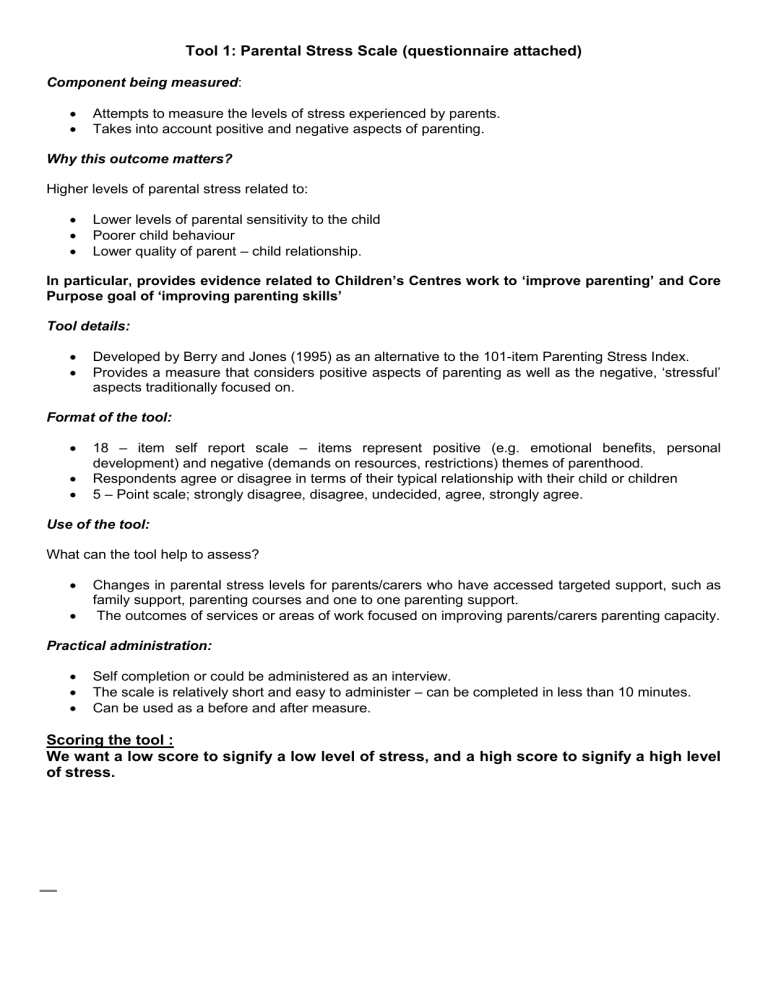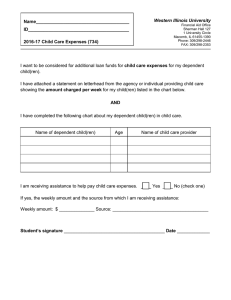
Tool 1: Parental Stress Scale (questionnaire attached) Component being measured: Attempts to measure the levels of stress experienced by parents. Takes into account positive and negative aspects of parenting. Why this outcome matters? Higher levels of parental stress related to: Lower levels of parental sensitivity to the child Poorer child behaviour Lower quality of parent – child relationship. In particular, provides evidence related to Children’s Centres work to ‘improve parenting’ and Core Purpose goal of ‘improving parenting skills’ Tool details: Developed by Berry and Jones (1995) as an alternative to the 101-item Parenting Stress Index. Provides a measure that considers positive aspects of parenting as well as the negative, ‘stressful’ aspects traditionally focused on. Format of the tool: 18 – item self report scale – items represent positive (e.g. emotional benefits, personal development) and negative (demands on resources, restrictions) themes of parenthood. Respondents agree or disagree in terms of their typical relationship with their child or children 5 – Point scale; strongly disagree, disagree, undecided, agree, strongly agree. Use of the tool: What can the tool help to assess? Changes in parental stress levels for parents/carers who have accessed targeted support, such as family support, parenting courses and one to one parenting support. The outcomes of services or areas of work focused on improving parents/carers parenting capacity. Practical administration: Self completion or could be administered as an interview. The scale is relatively short and easy to administer – can be completed in less than 10 minutes. Can be used as a before and after measure. Scoring the tool : We want a low score to signify a low level of stress, and a high score to signify a high level of stress. Parental Stress Scale The following statements describe feelings and perceptions about the experience of being a parent. Think of each of the items in terms of how your relationship with your child or children typically is. Please indicate the degree to which you agree or disagree with the following items by placing the appropriate number in the space provided. 1 = Strongly disagree 2 = Disagree 3 = Undecided 4 = Agree 5 = Strongly agree 1 I am happy in my role as a parent 2 There is little or nothing I wouldn't do for my child(ren) if it was necessary. 3 Caring for my child(ren) sometimes takes more time and energy than I have to give. 4 I sometimes worry whether I am doing enough for my child(ren). 5 I feel close to my child(ren). 6 I enjoy spending time with my child(ren). 7 My child(ren) is an important source of affection for me. 8 . Having child(ren) gives me a more certain and optimistic view for the future. 9 The major source of stress in my life is my child(ren). 10 Having child(ren) leaves little time and flexibility in my life. 11 Having child(ren) has been a financial burden. 12 . It is difficult to balance different responsibilities because of my child(ren). 13 The behaviour of my child(ren) is often embarrassing or stressful to me. 14 . If I had it to do over again, I might decide not to have child(ren). 15 I feel overwhelmed by the responsibility of being a parent. 16 Having child(ren) has meant having too few choices and too little control over my life. 17 I am satisfied as a parent 18 I find my child(ren) enjoyable Scoring To compute the parental stress score, items 1, 2, 5, 6, 7, 8, 17, and 18 should be reverse scored as follows: (1=5) (2=4) (3=3) (4=2) (5=1). The item scores are then summed. Scoring the tool : We want a low score to signify a low level of stress, and a high score to signify a high level of stress Overall possible scores on the scale range from 18 – 90. The higher the score , the higher the measured level of Parental stress Use a simple table to show the before and after results to evidence whether an intervention has had a positive effect. Comparison of individuals before / after or longitudinal overall Parental Stress Scale scores. The comparison of before and after mean average scores for groups (parents/carers accessing the particular intervention/group sessions, service or provision) References: Berry, JD, & Jones, W,H, (1995) The Parental Stress Scale : initial psychometric evidence. Journal of Social and Personal Relationships, 12, 463 – 472.

